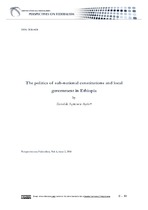| dc.contributor.author | Ayele, Zemelak Ayitenew | |
| dc.date.accessioned | 2019-08-19T06:59:31Z | |
| dc.date.available | 2019-08-19T06:59:31Z | |
| dc.date.issued | 2014 | |
| dc.identifier.citation | Ayele, ZA. (2014). The politics of sub-national constitutions and local government in Ethiopia. Perspectives on Federalism , 6(2): 89-115 | en_US |
| dc.identifier.issn | 2036-5438 | |
| dc.identifier.uri | http://hdl.handle.net/10566/4809 | |
| dc.description | The paper first describes the institutional structures, powers and functions of Ethiopia’s federal and state governments. This is followed by a brief discussion of the ethnic, social, and economic contexts of the regional states, after which an overview is provided of the structure, functions and powers of local government in Ethiopia. The paper then discusses the political circumstances that led to the involvement of the EPRDFdominated federal government in the process of establishing local government, the role that the government played and the consequences thereof. | en_US |
| dc.description.abstract | The federal Constitution of Ethiopia provides the regional states - the constituent unit of the federation –with the power to draft, adopt and amend their own constitutions, thereby allowing each of the regional states to use its constitution, among others, to design and adopt a system and structure of local government fitting to its circumstances. This is particularly important since the regional states differ from each other in terms of territorial size, ethnic composition and economic and social circumstances, making a one-size-fits-all approach inappropriate to the design of local government. Nevertheless, all levels of government in Ethiopia are controlled, directly or indirectly, by one party; the Ethiopian Peoples’ Revolutionary Democratic Party (EPRDF). Not only does it control all levels of government, the party has a highly centralised decision-making system founded on the principle of ‘democratic centralism’. Under this system, the party’s regional and local
structures, which also control government institutions at those levels, are involved only in the execution of decisions passed by the centre. Given such a context, the establishment and empowerment of local government – which took place in two phases – were driven from the centre. The process of establishing local government was influenced by the political exigencies the ruling party faced at particular times and the choices it made in reaction to them. This has undermined the role of the regional states and the relevance of their constitutions in creating local government systems appropriate to their circumstances. | en_US |
| dc.language.iso | en | en_US |
| dc.publisher | Perspectives on Federalism | en_US |
| dc.subject | Sub-national constitutions | en_US |
| dc.subject | Local government | en_US |
| dc.subject | Ethiopia | en_US |
| dc.subject | Decentralisation | en_US |
| dc.subject | Ethnic federalism | en_US |
| dc.title | The politics of sub-national constitutions and local government in Ethiopia | en_US |
| dc.type | Article | en_US |

